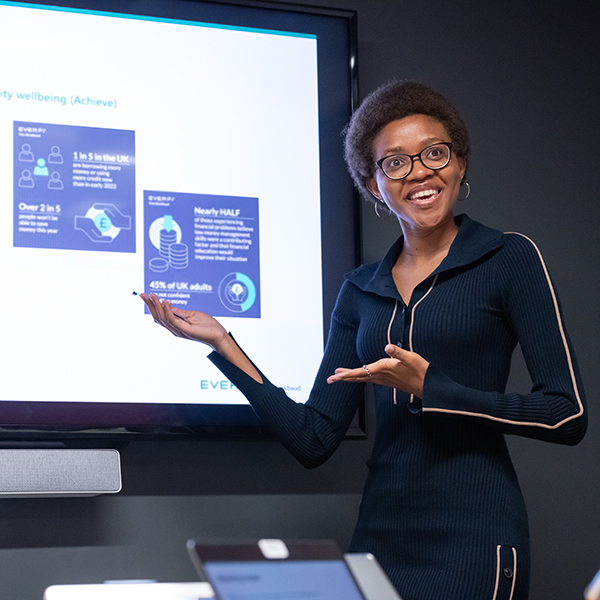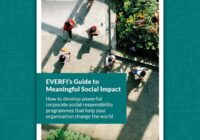Why education should be part of your CSR or ESG programme

Consumers, investors, and employees are keenly aware of the role of businesses in shaping society and addressing the needs and challenges of the community. Among the long list of issues worthy of corporate investment, education is often mistakenly overlooked. In this blog we’ll discuss why education, an important gateway to economic opportunity and better health, should be part of your company’s Corporate Social Responsibility (CSR) or Environmental, Social and Governance (ESG) programmes, and how that could look like.
Insight: Consumers prioritise education
Research by EVERFI UK shows that 80% of British consumers give preference to brands that are fast to act when they see inequalities that they can help address. Among the different causes that businesses can support, 83% of consumers prioritise education, followed by mental health (72%), sustainability (61%), and health and sports (46%) — issues that can also be addressed through education. Results from the UK survey are similar to those of an EVERFI US study with American consumers, indicating a possibly global interest in directing CSR and ESG budgets to education. The UK survey has also found that 87% of people believe businesses should support the development of wider skills that young people will need, suggesting that education should go beyond the school curriculum and equip people for the challenges life and work will throw at them.
Insight: Education means better lives and better business
There’s plenty of data showing that access to high-quality education tends to predict better outcomes later in life:
- By age 40, the average UK employee with a degree earns twice as much as someone qualified to GCSE level or below1.
- Higher levels of education are associated with better health and longer lifespans; tertiary education is particularly influential2.
- A one-grade improvement in overall GCSE attainment is associated with an average increase of £8,500 in lifetime earnings3.
There are also indirect links with better life outcomes, mediated by issues than can be, but are not always, addressed through education. For example, the best predictor of an adult’s life satisfaction is their emotional health at age 164, and nearly half of UK adults with financial problems believe low money management skills contributed to their issues5.
Beyond personal life outcomes, education also impacts businesses. Skilled workers help companies grow, and educated people are more likely to be financially well-off, thus becoming important consumers and even investors.
Creating a Loyal Consumer
The Impact of Corporate Social Responsibility and Education
Insight: Schools are facing challenges
A quarter of UK schools were likely to face a deficit in their budgets in the 2021-2022 academic year, with over 30% making cuts to balance their budgets. Without significant cuts or other actions, 70% of UK school leaders expect they would have a deficit budget in 2023-2024. School funding is particularly insufficient for students with special educational needs and disabilities, with 97% of schools saying they need more resources6. Deficits are already translating into fewer staff, less support for students, fewer curriculum-enriching activities, and larger class sizes7.
How businesses can support society through education
Organisations can support the younger generations by helping schools deliver high-quality curriculum-linked education, and by enabling them to teach essential life skills that are often only accessible to affluent pupils, who can pay for activities outside the classroom. Organisations can also reach adults and the broader community directly, but schools are an ideal channel, as they are at the heart of communities.
What kind of subjects and skills can businesses support?
From EVERFI’s research with teachers, we know that schools value real-life examples from businesses to help bring key concepts and topics to life. This is particularly important in science, technology, engineering, and maths (STEM) subjects, where concepts can seem abstract or difficult for children to understand or relate to. Schools and parents also want to develop well-rounded young people who are prepared for their future careers and life. Life skills such as digital and financial literacy, resilience, emotional and interpersonal intelligence, and work-enabling skills such as data science, are critical to this, and businesses can play an important role in demonstrating the importance of, and developing such skills in young people.
In what ways can businesses get involved?
Companies can support education through their CSR or ESG programmes in many ways: by developing learning resources to be used in the classroom, sponsoring online or face-to-face courses, donating equipment to disadvantaged communities, enabling their staff to share career knowledge with students, or by funding an online home learning hub, for example. Many businesses first ask schools what they can do to help, recognising that it is for teachers to say what they need. The more consistent and strategically developed an educational CSR or ESG programme is, the deeper and more long-lasting the impact it will have on the lives of participants.

Schools value real-life examples from businesses to help bring key concepts and topics to life, especially in STEM subjects and life skills
What education-based CSR and ESG looks like
Here are a few examples of companies prioritising education in their social impact programmes:
Provident Bank: teaching financial literacy
US-based Provident Bank set out to equip their community with strategic knowledge to make informed financial decisions. They did so through sponsoring an age-appropriate, easy-to-use online financial literacy course aimed at teenagers in their branch locations. By delivering the course through schools, they have reached over 7 thousand students who are now better prepared to deal with taxes, paycheques, credit, debt, loans, and personal savings.
Electronic Arts: developing STEAM skills
Electronic Arts’ Play to Learn programme is about empowering the next generation of leaders in science, technology, engineering, the arts, and mathematics (STEAM). Through a digital education programme, they use the latest new media technologies to bring complex STEAM concepts to life for students, supporting the development of skills and students’ interest in STEAM.
We can help you make a positive impact in your community
At EVERFI UK we are helping create a more equal society by providing students, teachers, and the broader community with evidence-based online courses, classroom learning materials, educational workshops, and behaviour-changing campaigns sponsored by organisations like yours. We have extensive knowledge of the UK educational landscape, a network of educators and subject experts, and a team highly experienced not only in educational provision but also in creative media and in consulting about community needs, programme development, and impact reporting for businesses.
We recognise that narrowing the learning gap is about far more than catching up in the traditional academic subjects, and that people of all ages need access to education on life skills that prepare them for a brighter, safer, and more resilient future. After all, subjects like financial education, online safety, or mental wellness should never be the preserve of the advantaged.
How can your business support education?
Get in touch to discuss your CSR or ESG goals and how education can take your social impact to the next level.
Sources:
1 – The IFS Deaton Review. (August 2022). Lack of progress on closing educational inequalities disadvantaging millions throughout life.
2- Raghupathi, V., & Raghupathi, W. (2020). The influence of education on health: an empirical assessment of OECD countries for the period 1995–2015. Arch Public Health 78, 20.
3- Department for Education. (June 2021). GCSE attainment and lifetime earnings.
4- Clark, A., Flèche, S., Layard, R., Powdthavee, N., & Ward, G. (January 2018). Origins of happiness: new research. What works wellbeing.
5- The Centre for Social Justice. (June 2022). On the money: A roadmap for lifelong financial learning.
6- NAHT. (September 2021). A failure to invest: The state of school funding in 2021.
7- National Education Union. (December 2021). Shortfall in school funding will entrench social division.
8- Hutchinson, J., Bonetti, S., Crenna-Jennings, W., & Akhal, A. (2019). Education in England: Annual report 2019.
Stay Informed
Best practices, the latest research, and insights from our expert network of partners, delivered right to your inbox.
Success!Thank you for signing up. We'll be in touch with more relevant content.








